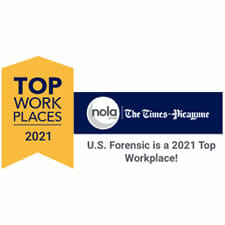We congratulate authors Michael D. Staley, M.Eng., P.E., M.ASCE; Tan Qu, Ph.D., P.E.; Michael K. Holden, M.Eng., P.E.; and Daniel M. Packer on being selected to present their Technical Paper at the ASCE 10th Forensic Engineering Congress on November 1-4, 2024, in Seattle, Washington. Organized by ASCE’s Forensic Engineering Division, this event provides an opportunity for forensic experts, engineers, and academics to share their knowledge and experiences in the field. Visit ASCE Forensic for more information.
We invite you to attend the event to gain valuable insights from our experts’ presentation on innovative research in forensic foundation evaluations.

Research on Evaluations of Residential Foundations
The paper’s working title is “Forensic Evaluation of Residential Foundations Experiencing Differential Movement: A Case Study Approach to the Application of Building Codes, Practice Standards, and Engineering Judgment.”
Abstract
The purpose of this paper is to illustrate the integration of practice guidance documents, insurance criteria, building code requirements, state statutes, engineering standards of care, and professional engineering judgment in the forensic evaluation of residential foundations experiencing differential movement using a series of case studies.
A review of the literature reveals the magnitude and frequency of residential structural defects as an important issue for forensic engineering practice. Once described as a hidden disaster, soil movement inflicts more damage to houses, buildings, roads, and pipelines than from floods, hurricanes, tornadoes, and earthquakes. A study of 10,000 residential structural claims suggested that soil movement beneath residential building foundations is the leading cause of structural damage, comprising more than 80% of residential structural defect claims. The practicing forensic engineer must develop processes for evaluating residential foundations experiencing adverse effects, often bounded by insurance constraints, without clear consensus on what constitutes a residential foundation structural defect.
The American Society of Civil Engineers (ASCE) Texas Section has developed the most germane guidance document for the evaluation of residential foundations. This paper applies the “Guidance for the Evaluation and Repair of Residential Foundations” (V.3 March 2022) to a series of case studies to illustrate the integration of practice guidance documents, insurance criteria, building code requirements, engineering analysis standards of care, and professional engineering judgment in the evaluation of residential foundations experiencing differential movement.
Potential Applications of Foundation Evaluation Research
Through their research, Mr. Staley, P.E.; Mr. Qu, Ph.D., P.E., Mr. Holden, P.E.; and Daniel M. Packer identified a lack of consistency in the application of the current published research on evaluating foundation construction defects. This inconsistency of methodology has also led to an inconsistency in findings. As a result, they aim to reduce type I (false positive) and type II (false negative) errors in the evaluation process and provide a more consistent, accurate, and reliable method of evaluating foundation defects in residential buildings.
Staley, Qu, Holden, and Packer’s findings will give engineers the tools to better interpret data and provide our clients with more reliable, consistent results. They provide supporting data and diagrams illustrating the science and methodology used to reach conclusions. By reducing ambiguity and improving efficacy of foundation evaluation findings in these new methods, engineers can help clients accurately determine the best next steps in handling a case.
Foundation Evaluations from U.S. Forensic
Our experts at U.S. Forensic utilize this newly developed approach. This implementation has already proven effective for many of our clients. By acquiring data from foundation failure cases worked, our experts were able to identify key factors in improving the evaluation process leading to consistent and reliable results.
U.S. Forensic’s clients are benefiting from this science backed approach. We believe continued research will improve the methods of evaluating foundation defect cases, positively impacting our industry.
Please visit our construction defect and structural evaluations pages for information on similar services U.S. Forensic provides.




